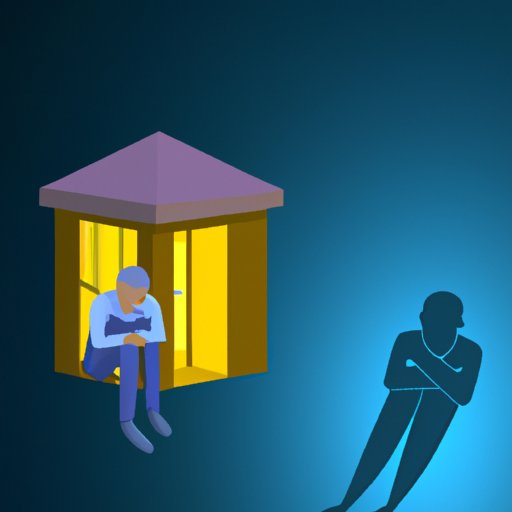Introduction
Loneliness is an emotional state that is often felt when there is a lack of meaningful connections or relationships with others. It can be described as a feeling of emptiness and disconnectedness from those around us. Although it is a common experience for many people, loneliness can have a significant impact on our health. In this article, we’ll explore how loneliness can adversely affect both our physical and mental well-being.

Exploring the Physical and Mental Effects of Loneliness
Studies have shown that loneliness has both physiological and psychological consequences. Let’s take a closer look at each one.
Physiological Impact of Loneliness
The physical effects of loneliness are numerous. Research has found that loneliness can lead to an increase in stress hormones, such as cortisol and adrenaline. These hormones can have a negative impact on the body and can lead to an increased risk of high blood pressure, heart disease, and stroke. Additionally, loneliness can weaken the immune system and make us more prone to illness.
Psychological Impact of Loneliness
The psychological effects of loneliness can be just as damaging as the physical ones. People who are lonely are more likely to experience depression and anxiety. They may also feel a sense of hopelessness and helplessness, which can further contribute to their mental health struggles. Additionally, people who are lonely may struggle with low self-esteem and a lack of purpose in life.
Examining the Impact of Social Isolation on Health
Social isolation, which is defined as the lack of contact with other people, can also have a detrimental effect on our health. Studies have found that people who are socially isolated are at a higher risk of developing chronic diseases, such as cardiovascular disease, diabetes, and cancer. Additionally, social isolation can increase the risk of depression and anxiety.

Investigating Loneliness as a Risk Factor for Disease
Research has found that loneliness can increase the risk of certain diseases, such as cardiovascular disease, diabetes, and cancer. A study published in the journal Circulation found that loneliness was associated with a 30% higher risk of developing coronary heart disease and stroke. Additionally, a study published in the journal Diabetes Care found that loneliness was linked to a 59% increased risk of developing type 2 diabetes. Lastly, a study published in the journal Cancer Epidemiology, Biomarkers & Prevention found that loneliness was associated with a 32% greater risk of developing cancer.

Understanding How Loneliness Affects Our Brain Chemistry
Studies have also found that loneliness can alter our brain chemistry. It has been linked to imbalances in neurotransmitters, such as dopamine and serotonin. Additionally, research has found that loneliness can cause structural changes in the brain, such as a decrease in the volume of the hippocampus, which is involved in learning and memory.
Highlighting Coping Strategies to Overcome Loneliness and Improve Health
Fortunately, there are ways to cope with loneliness and improve our health. Here are a few strategies:
Developing Meaningful Connections
One of the best ways to combat loneliness is to build meaningful connections with others. This can be done by joining clubs, attending support groups, or simply spending time with family and friends. Making meaningful connections can help reduce feelings of loneliness and provide emotional support.
Practicing Self-Care
Self-care is essential for managing feelings of loneliness. Taking care of yourself by exercising, eating healthy, and getting enough sleep can help boost your mood and improve your overall well-being. Additionally, engaging in activities that bring you joy, such as reading, listening to music, or taking up a new hobby, can help alleviate feelings of loneliness.
Seeking Professional Help
If you are struggling with loneliness, it may be helpful to seek professional help. Talking to a therapist can help you identify the underlying causes of your loneliness and develop coping strategies to manage it. Additionally, medication may be prescribed to help manage symptoms of depression and anxiety.
Conclusion
Loneliness can have a serious impact on our health, both physically and mentally. It can increase the risk of chronic diseases, such as cardiovascular disease and cancer, as well as weaken the immune system. Additionally, loneliness can lead to imbalances in brain chemistry and structural changes in the brain. Fortunately, there are ways to manage loneliness and improve health, such as developing meaningful connections, practicing self-care, and seeking professional help. If you are struggling with loneliness, remember that help is available.
(Note: Is this article not meeting your expectations? Do you have knowledge or insights to share? Unlock new opportunities and expand your reach by joining our authors team. Click Registration to join us and share your expertise with our readers.)
